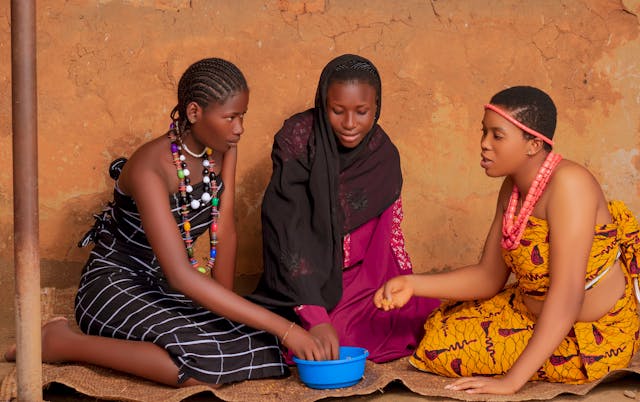Discover how Cassandra Rieger Mahube is empowering communities through grassroots leadership, innovation, and bold social action.
You may not see her name splashed across global headlines, but in the communities she touches, Cassandra Rieger Mahube is a force. She’s not just another nonprofit leader or social worker following a template. She’s rewriting the rulebook on what grassroots empowerment looks like in real life.
Born with an uncanny sense of justice and a relentless desire to fix what’s broken, Cassandra isn’t someone who waits for systems to change. She builds her own systems. Whether she’s navigating broken bureaucracies or uniting fractured neighborhoods, Mahube leads with one unwavering belief: people, especially those overlooked, deserve to be heard, seen, and equipped.
But what exactly does she do? What makes her approach stand out in the saturated world of social development? Buckle up, because this isn’t your typical hero story. It’s something deeper.
What You'll Discover:
The Early Embers: What Sparked Her Drive?
Every changemaker has a moment that flips the switch. For Cassandra, it wasn’t a single event, it was the quiet accumulation of injustice. Growing up in a low-income township riddled with generational poverty, she watched capable people crumble under systems that simply didn’t care.
But she didn’t just internalize that injustice. She studied it. Dissected it. And eventually, weaponized it into purpose.
At university, instead of getting swept up in academic theory, Cassandra dove into community advocacy. She wasn’t interested in policy papers that gathered dust. She wanted results. Tangible, street-level change.
She started mentoring girls in nearby schools. She organized youth roundtables. She built relationships not based on handouts but on hands-on collaboration. She was laying the groundwork for a philosophy that now underpins her entire approach: empowerment isn’t given, it’s co-created.
Breaking the Savior Complex: Her Unusual Philosophy
Cassandra Rieger Mahube doesn’t save communities, she activates them.
That subtle shift changes everything. Unlike well-meaning outsiders who swoop in with pre-made solutions, Mahube starts with listening. Her work begins at ground level, where the real experts, the community members themselves, lead the conversation.
She once said in a public workshop, “I’m not here to deliver power. I’m here to remind people they already have it.”
That’s not just talk. Her initiatives don’t revolve around charity. They revolve around restructuring mindsets, catalyzing economic ownership, and nurturing hyper-local leadership.
Let’s break that down.
Programs with a Pulse: What Cassandra Actually Does
This isn’t theoretical. Cassandra’s methods are as concrete as the streets she walks.
Youth Innovation Labs
Tired of hearing that today’s youth are “too lost to lead,” Cassandra set up Innovation Labs, flexible, tech-enabled community spaces where teens and young adults create, experiment, and launch real-world projects.
We’re talking about:
- Community-driven podcast stations
- Student-led tutoring networks
- Local journalism initiatives exposing municipal corruption
Instead of pushing youth toward traditional employment models, she encourages entrepreneurial thinking rooted in social good.
The Mahube Women’s Cooperative
Most empowerment programs for women still revolve around skills training for jobs women never wanted in the first place. Cassandra flipped the model.
Her women’s cooperative doesn’t train women to sew for someone else’s company. It trains them to own their supply chains, start agro-businesses, and become regional employers.
The cooperative’s micro-lending branch, peer mentoring circles, and business incubation workshops form a self-sustaining ecosystem. Not dependent on donors. But dependent on each other.
Conflict Mediation Circles
When communities are divided, by politics, class, or trauma, Cassandra steps in with her trained mediation circles. These aren’t therapy sessions. They’re restoration engines.
Participants don’t just talk, they build shared solutions. Schools, local councils, and even police stations have begun adapting her circle model.
This isn’t just peacekeeping. It’s power rebalancing.
Why Her Approach Actually Works (When Others Fail)
Most “community uplift” efforts suffer from one fatal flaw: they treat symptoms, not root causes.
But Cassandra doesn’t come with band-aids. She performs surgery.
She understands:
- Poverty isn’t just about income, it’s about lack of options
- Youth crime isn’t about rebellion, it’s about disconnection
- Gender inequality isn’t cultural, it’s systemic and structural
Her programs don’t aim to help people feel better. They aim to equip people to change their own conditions. That’s a big distinction, and it’s why her impact endures long after her team leaves.
Real Stories, Real Ripples
Let’s zoom into a few firsthand accounts. These aren’t marketing copy. These are real-world reflections from the people she’s walked beside.
Lerato: From Silent Teen to National Youth Delegate
At 15, Lerato had never spoken publicly. After attending Mahube’s Innovation Lab, she not only launched a radio segment for teen mental health but was later selected as a national youth delegate on education reform.
Cassandra didn’t script her voice, she amplified it.
Moses: From Unemployed to Employer
Once written off by the job market, Moses attended one of the women’s cooperative business clinics (yes, men are welcome too). He now runs a local eco-brick startup employing five neighbors. His startup was recently featured on a national green tech panel.
Cassandra didn’t hand him a job, she sparked an industry.
Anele and Busi: Former Rivals, Now Co-Founders
Two women from rival community councils used Cassandra’s mediation circles to dismantle years of animosity. Today, they co-run a youth literacy nonprofit serving both their regions.
Cassandra didn’t solve their fight, she gave them tools to transform it into purpose.
Cassandra’s Radical Views on Leadership
Cassandra is allergic to traditional hierarchies.
In fact, she’s known to say: “If I’m the most important person in the room, we’ve failed.”
She promotes:
- Distributed leadership: Everyone’s a leader of something
- Mistake-driven learning: You can’t innovate if you fear failure
- Radical transparency: No gatekeeping of funding or strategy
It’s no surprise that her leadership model is now being studied in academic and business circles alike. She’s not running an organization. She’s modeling a mindset.
The Bigger Picture: Global Lessons from Local Action
What makes Cassandra’s work so powerful is that it doesn’t rely on flashy PR or international aid. It works because it’s deeply rooted in context, yet scalable in principle.
Her model teaches us:
- Empowerment must be locally led but globally informed
- Sustainable change grows from ownership, not dependency
- Effective leadership means stepping aside, not just stepping up
That’s why cities across Africa, and even some in Europe, are consulting with her team to replicate aspects of her programs. Not to clone them, but to learn how to grow indigenous systems of resilience.
What Critics Say, and Why She Welcomes Them
Of course, Cassandra’s not without critics. Some say her methods are too idealistic. Others believe she’s pushing change too quickly for conservative institutions to adapt.
Her response?
“If everyone agrees with you, you’re not changing enough.”
She doesn’t chase approval. She chases impact. And sometimes, that means being uncomfortable. For herself. And everyone else.
Key Takings
- Cassandra Rieger Mahube empowers communities by co-creating change, not imposing it.
- Her approach centers around activating internal power in youth, women, and conflict zones.
- Programs like Innovation Labs, Women’s Cooperatives, and Mediation Circles create lasting, community-owned impact.
- Her leadership philosophy is decentralized, transparent, and experimental.
- Mahube’s story offers a blueprint for radically human empowerment in a world addicted to top-down reform.
- She’s not building projects, she’s growing movements.





